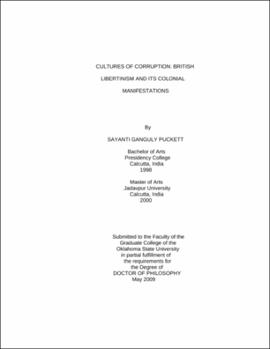| dc.contributor.advisor | Frohock, Richard | |
| dc.contributor.author | Ganguly Puckett, Sayanti | |
| dc.date.accessioned | 2013-11-26T08:29:32Z | |
| dc.date.available | 2013-11-26T08:29:32Z | |
| dc.date.issued | 2009-05 | |
| dc.identifier.uri | https://hdl.handle.net/11244/7064 | |
| dc.description.abstract | Scope and Method of Study: My dissertation treats Britain's colonization of India and examines how it produced a particularly subversive western influence among upper-class Bengali men, illustrating in particular the many startling similarities between the lifestyles and behavior of the Restoration rakes (1660-1700) and the babus of Calcutta. The babus, in imitation of the Restoration rakes, appear throughout nineteenth-century colonial Calcutta in the guises of world-wise libertines, debauched hedonists, or as a carefully constructed blend of both types. Real life rakes like the Earl of Rochester in Restoration England and Prankrishna Haldar in nineteenth-century Calcutta were often models for the fictional libertines that gained widespread popularity. I examine how these fictional figures and their real life counterparts in British society of the Restoration era and Bengali society of the nineteenth-century operate. In addition, the dissertation explores how the philosophy and lifestyle of the Restoration rakes were imported into a uniquely Indian context, thus exhibiting the rise of a new culture of libertinism in Bengal that helps to enrich our understanding of the British-Indian colonial relationship. The work draws parallels between the rakes and the babus, chiefly those involving the dissipation of inherited wealth in meaningless pursuits, eschewing conventional work at all costs, indulgence in frivolity and entertainment, extreme concern with fashion, pursuit of sexual relationships, resorting to procuresses in order to satisfy sexual appetites, and the cultivation of certain intellectual pursuits. | |
| dc.description.abstract | Findings and Conclusions: The Restoration rake has been well examined in the western academic world; however, my research views them through the lens of a lesser known Bengali culture, and thus provides a new context for their impact on world culture. At the same time, my dissertation introduces to a western audience many hitherto unknown Bengali figures and works of art. By introducing Bengali texts to an international audience, the dissertation brings into focus rich material from Bengali culture. This work, then, contributes to an enrichment of our understanding of the fascinating culture and literature of libertinism as it extends beyond the standard British figures and texts that one normally encounters in scholarship. As such, my study represents an innovative and necessary examination of a significant cross-cultural current and exposes an under-represented though influential figure in the formation of modern Bengali culture. | |
| dc.format | application/pdf | |
| dc.language | en_US | |
| dc.rights | Copyright is held by the author who has granted the Oklahoma State University Library the non-exclusive right to share this material in its institutional repository. Contact Digital Library Services at lib-dls@okstate.edu or 405-744-9161 for the permission policy on the use, reproduction or distribution of this material. | |
| dc.title | Cultures of corruption: British libertinism and its colonial manifestations | |
| dc.contributor.committeeMember | Decker, William M. | |
| dc.contributor.committeeMember | Mayer, Robert | |
| dc.contributor.committeeMember | Gethner, Perry J. | |
| osu.filename | GangulyPuckett_okstate_0664D_10252 | |
| osu.accesstype | Open Access | |
| dc.type.genre | Dissertation | |
| dc.type.material | Text | |
| dc.subject.keywords | british literature | |
| dc.subject.keywords | colonialism | |
| dc.subject.keywords | cross-culturalism | |
| dc.subject.keywords | indian literature | |
| dc.subject.keywords | libertinism | |
| dc.subject.keywords | restoration comedy | |
| thesis.degree.discipline | English | |
| thesis.degree.grantor | Oklahoma State University | |
